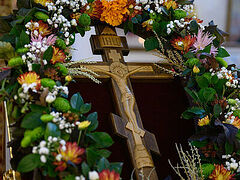For God so loved the world,
that He gave His only begotten Son,
that whosoever believeth in Him should not perish,
but have everlasting life (Jn. 3:16).
Beloved faithful!
Very little time separates us from the feast of the Exaltation of the Cross of the Lord. Therefore, the Holy Church reminds with the voice of present Gospel about the Incarnation of the Lord, His voluntary suffering, the Cross, and the immeasurable love that He manifested to us for the sake of our salvation. The Lord Jesus Christ Himself reveals the ineffable mystery of His Incarnation to us when He says:
No man hath ascended up to Heaven, but he that came down from Heaven, even the Son of Man Which is in Heaven (Jn. 3:13).
That is, no one else has ascended to the right hand of the Father save the Son Who was incarnate for us and endured the Cross for all. However, we mustn’t understand this as though the Son, having descended from Heaven, was not with the Father for a time. As God, He was at once in Heaven and on Earth, and on the Cross in full view of people, like the guiltiest of all, condemned to death. For the Savior came not only to heal the sick or drive the money changers out of the Temple. He came to endure death for us. And not an ordinary death, but death on the Cross. Not in some secluded place, not in some empty field, but up on Mt. Golgotha, to be seen by angels, men, and demons; so all might believe that He is the Savior of the world and might be delivered from condemnation from sin.
That’s why He sets forth the example of Moses. After all, when Moses passed through the Arabian desert of Edom together with the chosen people, a den of poisonous snakes lunged at the people, and whoever was bitten immediately died. And then, when Moses prayed, God told him to cast a brass serpent, lift it up on a pole, and fasten it to the highest place. And whoever was bitten by a snake, let him immediately look at this pole and the brazen serpent and live (Num. 21:8). And when Moses did this, he saved the people from such a cruel death.
What an amazing semblance! After all, Moses prefigures Christ, Who came to lead us out of slavery to satan. The chosen people are us, Christians. The desert of Edom is the world, this vain life. And the poisonous snakes are the demons and sin that bring death. The bite, the poisoning, and the terrible death indicate the eternal death of sinners after committing any sin. And looking upon this pole and the brass serpent is our deliverance from death, hell, and torment—if we look at Christ, crucified for us on the Cross.
Do you see the depth of wisdom? The serpent is slain by a serpent. The pain of being bitten is healed by the pain of Christ’s death. Death is overcome by death. Life is bestowed by the Fount of Life. It’s enough to look at this pole in the midst and the brazen serpent for man to be delivered from death. And it’s enough for us to look at Christ, hanging dead on the Cross, to live eternally by faith in Him.
This serpent was lifted up amidst the crowd so everyone would see it, and Christ ascended amidst the crowd, in the midst of the earth, so all might see Him, ask about Him, see His wounds, believe in Him, and in believing, no longer die, but have life eternal (cf. Jn. 3:14-16). King David also says this with his prophetic voice: Thou hast ascended on high, Thou leddest captivity captive, Thou didst receive gifts among men (Ps. 67:19). Jesus Christ ascended to the height of the Cross, and there, having killed sin, took captive all the people enslaved by satan, and made them sons of God. And by the outpouring of the Holy Spirit, He gave innumerable gifts to men, making them partakers of the Kingdom of Heaven. And everything that Jesus Christ did for us, shows how boundless is the love of God for man, for us.
For God so loved the world, that He gave His only begotten Son, that whosoever believeth in Him should not perish, but have everlasting life. For God sent not His Son into the world to condemn the world; but that the world through Him might be saved (Jn. 3:16-17).
Oh, the Divine and ineffable love of God!
You were looking upon us from Heaven. You saw how we are enslaved to the devil. You saw how we are fettered by sin. You heard our weeping. You have taken pity upon our tears. You have taken mercy upon our souls! You remembered that you are Father, and that You have children; that you are Lord, and You have slaves; that You are God, and You have lost people on Earth! And to gather us, You sent Your only Son; and so as not to terrify us, You clothed Him in a human body and in the robe of a poor wanderer.
And in order to redeem us from sin and bring us back to faith, You gave Your son into human hands. You permitted Him to be crucified on the Cross in full view of all, so that everyone could see Him throughout the vastness of the countries, seas, and continents: Jews, Greeks, Arabs, all people; and that in believing they might be saved.
Who among men loves as the Creator loves men? Who among mortals loves as does the Lord? Who among our fathers can love as does the Father of Lights? No one, no one.
Our love, if it still exists, is but a shadow, a dream. We love those who love us. We respect those who respect us. We forgive those who forgive us. We feed those who feed us. And we hate those who hate us, we beat those who beat us, and we long for revenge even on the parents who raised us. We don’t want to love with all our hearts. We don’t want to forgive our enemies. We don’t want to listen to our parents and sincerely love our children.
But God’s love is not like that. God’s love is perfect because God is perfect. It’s perfect because it doesn’t manifest itself in palaces and at feasts, but on the Cross; it reveals itself to us in suffering. We love God and others only in peaceful times and in satiety; and even then, mostly with our mouths. But God loves us always—especially in times of adversity and temptation. He loves us when we pray and when we sleep; when we go to church and when we go to the tavern; when we repent, and when we sin. He always loves us as a kind and merciful Father.
In times of danger, in times of temptation, we run, we hide, we betray our brother, we lie, we even kill, just to survive. But God loves us to the end (cf. Jn. 13:1). In times of danger, He doesn’t abandon us, but goes ahead, carries our cross for us, is the first to ascend upon it, is the first to endure blows, and the first to die in the flesh so that we might live.
Who has ever loved us more? And Who has shed their blood for us? What could the Father give that is more valuable than His Son? And what more could the Son do for us? He created us out of love and gave us the spirit of life. Out of love, He endured with us when we sinned. Out of love, Christ came to us. But the highest love was manifest there, up on the Cross, in suffering. After all, even great love that is untested by blows, troubles, and tears is not perfect, not Divine love.
Beloved faithful!
We must respond to such an abyss of Divine love and mercy with the same love and mercy. Did He love us? Let us also love Him. Did He forgive us? Let us also forgive. Did He endure the Cross for us? Let us also endure the cross of the sorrows of this life. Did He die for us? Let us also lay down our lives for His love. How? By raising our children in the fear of God, suffering disrespect, beatings, and even death for others. After all, according to the word of the Lord, Greater love hath no man than this, that a man lay down his life for his friends (Jn. 15:13).
How moved we are when we see our parents face some danger for us; when we see our friends ready to rush into a fire to save us; a doctor working so hard, doing everything to save our lives. People would be touched if we tried to do everything we can for their honor, health, salvation. And if we say to a sick man: “Be healthy,” and to the hungry and thirsty: “May God have mercy on you; go in peace,” and to the despondent: “Endure a little bit more and God will comfort you,” this is not Christian love; it’s not full, living, true love, but a hypocritical, false, deceptive love.
To love another means not only to comfort him in word, but to go to the poor man’s house, to light a fire for the man who is freezing, to instill hope in the heart of the despondent; it means to wash the clothes of the man who is suffering on his sickbed, to turn him over to the other side, to carry him to the hospital in your arms, to the priest for Confession. To love another means to feed a beggar, to weep with the weeping and laugh with the laughing; not to lead anyone into temptation, and to be ready to lay down your life for others.
To love God with all our heart, soul, and strength means to give our hearts to God—not to lusts, pleasures, and the devil. It means hearing and fulfilling all His commandments, for He Himself says:
He that hath My commandments, and keepeth them, he it is that loveth Me (Jn. 14:21).
To love God means laying down our lives for His love; it means loving all people first of all.
If a man say, I love God, and hateth his brother, he is a liar: for he that loveth not his brother whom he hath seen, how can he love God Whom he hath not seen? (1 Jn. 4:20).
“Whoever loves all men equally,” says one Holy Father, “is perfect in love.”
And if our love for another has a measure—“as thyself,” then love for God is immeasurable—“with all our heart, with all our strength,” because God’s own love is boundless. Blessed and worthy of Christ is he who has Divine love!
But alas, how alien we are to the love of Christ! We, today’s Christians, have almost grown tired of hearing the words of the Gospel. But who else will do it? No one. We have practically no time to hear the ringing of the church bells, to go to the services, to confess to a priest. But who will labor for us? We don’t have enough money for fancy clothes, delicious food, beautiful homes, and so on, so how can we give anything to beggars? How can we feed the hungry? Woe to us, the Christians of today!
Once a hermit was asked:
“Father, when will the end come?”
And the elder replied:
“You know when? When there is no longer a path from neighbor to neighbor.”
That is, when the world is filled with anger, hatred, enmity, judgments, fights, divorces; when brother against brother, neighbor against neighbor, father against son, mother against daughter, tribe against tribe, nation against nation will be at enmity. And you can’t help but wonder: Haven’t these times come? After all, we see how peoples, gripped by hatred and revenge, seethe like the waves of a raging sea. We see how a huge multitude is crushed by terrible sins, how they are wasting away from such hatred and enmity towards each other. There is no trust between spouses; there is no respect among children; there is no love between neighbors. Weeds and thistles now grow on the path of harmony and Christian love. You won’t hear a good word from anyone anymore. You won’t receive any good advice from anyone, or a cup of cold water, or even the slightest consolation. Gone, gone is Christian love!
Thus, if we want to be with Christ, if we want to live forever, let us turn back to the path of love. Let us cut down the weeds of hatred. Let us live in harmony with all people. Let us observe all the commandments of Christ and wait for the Lord, for He is soon coming as the Dread Judge of the world. Let us forgive and be forgiven. Let us be merciful and receive mercy. Let us nourish love for all, for love never ceases (1 Cor. 13:8).




